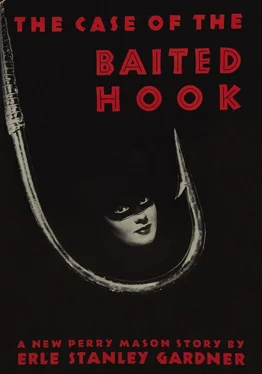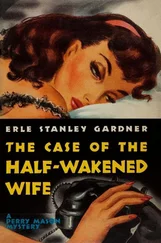“Did you agree to co-operate with him?” Berger asked.
“I objected at first,” Mattern said. “Naturally the information came as a shock to me, and I was astonished to think that a man in Mr. Mason’s position would make such a proposition to me.”
“And did you communicate your reluctance to Mr. Mason?”
“I did. I told him that I couldn’t do it.”
“And what did Mason say?”
“Mason pointed out to me that Tidings was dead, and there was nothing I could do that would restore him to life, that it would be much better for all concerned, particularly his clients…”
“And he used the word in that connection and in the plural?” Berger asked.
“That’s right, he did. Yes, sir.”
“Go ahead.”
“… that it would be much better for his clients if it was made to appear that Mr. Tidings had met his death after noon of that day. He asked me if it wasn’t true that Mr. Tidings had secured a cashier’s check in an amount of fifty thousand dollars which was to be delivered for the purchase price of the stock. I told him that this was true. So then Mr. Mason suggested that he would call me later on, on the telephone, that I was to tell his secretary that Mr. Tidings was available and would talk with Mr. Mason. Mason said that he’d come on the line, and I could carry on a conversation, and he would pretend that it was Tidings on the other end of the line, that I was also to advise any other person who called that Mr. Tidings was in his office but was engaged in a conference and couldn’t be disturbed, that I was to go ahead with the stock purchase just as though Tidings were there, and that I was to swear that Tidings had accompanied me down in the elevator; and then, to clinch matters after the purchase had been completed, I was to swear that Tidings had called up and asked me if everything had gone through according to schedule.”
“And he promised you ten thousand dollars for this?” Berger asked.
“Yes, sir.”
“Was that ten thousand dollars paid?”
“Yes, sir.”
“How?”
“In fifty- and hundred-dollar bills.”
“What did you do with that money?”
“I deposited it in a bank.”
“The bank where you carry your regular account?”
“No, sir. It was another bank. I went to a bank where I wasn’t known. I told them that I wished to open an account and made the deposit under a fictitious name.”
“What name?”
“Anthony Blake.”
“Did you tell anyone about this?”
“No, sir… Not until I told you early this morning.” Berger glanced at Mason. “All right, Mason,” he said, “what have you to say to this?”
“I want to ask him a couple of questions,” Mason said.
“I don’t think this is the time or the place,” Berger said. “This isn’t a trial. I’m merely putting my cards on the table showing you the information which I have at hand.”
Mason ignored the comment and said to Mattern, “I suppose, Mattern, the district attorney found out about that fictitious account and asked you to explain it.”
“He did nothing of the sort,” Mattern said indignantly. “No one knew anything about that account. My conscience started bothering me, and I finally came to the district attorney and explained all the circumstances to him.”
Mason turned to Hamilton Berger. “You can see what happened,” he said. “Mattern knew that Tidings was dead. He confessed to me that he’d discovered that fact early Tuesday morning. Bolus, who’s president of the Western Prospecting Company, was planning on unloading his stock. He’d offered Mattern a ten-thousand-dollar bonus when the deal went through. I pointed out to Mattern that with the facilities at your command, you’d be able to trace that payment through the bank. He knew he was trapped, so he concocted this story.”
“That’s a lie,” Mattern said.
The district attorney said, “You can’t make anything like that stick, Mason. I’ve talked with Emery Bolus, the president of the Western Prospecting Company. It’s true that the sale was of private stock. I believe it was the stock held by Bolus, who wished to unload, but Bolus knows nothing whatever of any ten-thousand-dollar payment and had no inkling that Tidings was dead at the time the transaction was completed. You can’t escape the consequences of your act by trying to drag others into it.”
“And,” Mason went on calmly, “Bolus has consulted an attorney. Bolus learned that under the law of agency the sale would have been invalid in the event it appeared Tidings had died — unless it should appear that I had consented to the sale as attorney for Byrl Gailord, which would have made Mattern an agent for the beneficiary instead of the trustee. Under those circumstances, Bolus could insist that the sale was valid. This story has been concocted in order to bolster up that sale. The stock is probably valueless. Bolus has agreed to give Mattern another five or ten thousand to tell this story. It gives Mattern an out, accounts for his actions, and will leave Bolus still holding the money.”
“That,” Berger said coldly, “is an ingenious attempt to distort the facts, but unfortunately for you, the evidence doesn’t corroborate it.”
Mason said, “All right. I’ll go at it from another angle. How about you, Mrs. Tump? You are the one who employed me to represent the interests of Byrl Gailord. You know when you came to me. When was it?”
“I called on you,” she said, “on Tuesday morning. I guess it was around ten o’clock. But you knew that I was going to call on you and that you were going to represent Byrl.”
“How in Heaven’s name did I know that?” Mason asked. “I’m not a mind reader.”
“You knew it through Robert Peltham,” she said. “You’ve been in touch with Robert Peltham ever since this case started. Do you deny that Robert Peltham called on you and employed you to represent his interests Monday night?”
“What makes you think that happened?” Mason asked.
“He told me…”
“Don’t answer that question,” Berger interrupted. “We’re not here to give Mr. Mason an unlimited opportunity to fish for information and then work out a story which will hold water.”
“What is the purpose of this interview?” Mason asked.
“Simply to give you an outline of the circumstances which make me feel that it’s my duty to have a warrant issued for your arrest on a charge of criminal conspiracy and on a charge of being an accessory after the fact.”
“Accessory to what?” Mason asked.
“To the murder of Albert Tidings.”
“I see,” Mason commented calmly, “and whom am I supposed to be aiding and abetting?”
“Robert Peltham.”
“Oh,” Mason said, “so he’s the murderer now, is he?”
“You know he is.”
“And how do I know it?”
“He told you so shortly after midnight on Monday night — or to be exact, the time was Tuesday morning. You met him at your office, and he retained you. You arranged for an alibi for Peltham and his mistress. In order to make that alibi good, you wanted it to appear that Tidings was still alive on Tuesday morning, that he met his death sometime after noon on Tuesday. Everything that you have done, Mason, supports that conclusion. The circumstantial evidence is strongly against you, and in view of the statement of Mattern, who is a direct witness, I feel it my duty to institute criminal proceedings against you unless you can convince me that you are innocent.”
“And how can I convince you?” Mason asked. “I can’t ask questions of the witnesses. I can’t even find out what evidence you hold. My hands are tied.”
“Not if you’re innocent,” Berger said. “You don’t need to cross-examine witnesses in order to find out what cards I hold in my hand. You can make a simple, direct statement of your connection with the case.”
Читать дальше












